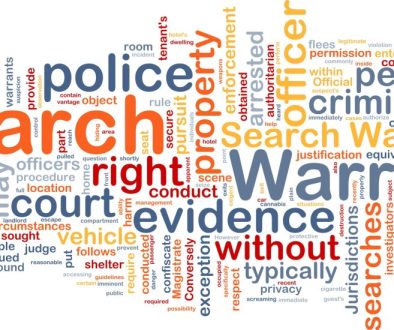What to Know About Consent, Statements to Police, Miranda Warnings, and Warrantless Car Search in Pennsylvania
Our Criminal Defense law firm represents people charged with crimes and offenses in Pennsylvania and New Jersey. Frequently we encounter cases where the admissibility of evidence is critical issue. Admissibility is key area of attack for your criminal defense lawyer in any cases involving illegal drugs or firearms.
In Pennsylvania, your defense lawyer can assert your right against illegal search and seizure with a Motion to Suppress evidence. If your lawyer doesn’t fight this issue, it is waived and you can’t argue it at trial or on appeal. These pre-trial motions are based on your rights under the United States and Pennsylvania Constitutions.
What is the Constitutional Basis for Your Right Against Illegal Search and Seizure?
The Fourth Amendment of the United States Constitution and Article I, Section 8 of the Pennsylvania Constitution protect an individual’s right to be free from unreasonable searches and seizures.
“[T]he right of the people to be secure in their persons, houses, papers, and effects, against unreasonable searches and seizures, shall not be violated….”); Pa. Const. Art. I, § 8 (“The people shall be secure in their persons, houses, papers and possessions from unreasonable searches and seizures….”
As the Pennsylvania Supreme Court has stated in countless opinions, under both the Fourth Amendment to the United States Constitution and Article I, Section 8 of the Pennsylvania Constitution, searches conducted in the absence of search warrant are per se unreasonable, unless they satisfy one of the recognized exceptions to the warrant requirement. An exception exists when a person consents to the search.
Why is the Issue of Consent Important?
Consent must be voluntarily given, and not the result of duress or coercion, express or implied, and voluntariness is a question of fact to be determined from all the circumstances. In making the determination of whether a consent is free and voluntary, the following factors are taken into consideration:
- the person’s knowledge of the right to refuse to consent to the search;
- the maturity, sophistication and mental or emotional state of the defendant (including age, intelligence and capacity to exercise free will);
- and the presence or absence of physical contact or police direction of the subject’s movements,
- the demeanor of the police officer,
- the manner of expression used by the officer in addressing the subject,
- the location of the encounter,
- and the content of the interrogatories or statements.
Consent to search may be express or implied. The standard for measuring the scope of an individual’s consent is one of “objective reasonableness,” considering what “a reasonable person would have understood by the exchange between the officer and the person who gave the consent
Warrantless Car Searches in Pennsylvania
In the absence of a warrant and/or consent, an automobile search requires a showing of probable cause and exigent circumstances. If the Court believes that the accused has satisfied the issue or intelligence and the proper mental capacity, the only question then is whether consent is given voluntarily and not as the result of duress or coercion.
Keep in mind that the fact that a person has been placed in handcuffs is not sufficient to create a presumption of lack of voluntariness of consent. It is a totality of the circumstances analysis
Statements Made to Police – When do police have to give Miranda Warning?
The United States Supreme Court has held that, before law enforcement officers question an individual who has been in taken into custody or has been deprived of his freedom in any significant way, the officers must first warn the individual that he has the right to remain silent, that anything he says can be used against him in a court of law, that he has the right to the presence of an attorney, and that if he cannot afford an attorney one will be appointed (Miranda Rights).
These special procedural safeguards are required only where a suspect is both taken into custody and subjected to interrogation.
A person is in custody for Miranda purposes only when he is physically denied his freedom of action in any significant way or is placed in a situation in which he reasonably believes that his freedom of action or movement is restricted by the interrogation. “Interrogation” is defined as “questioning initiated by law enforcement officials.”
Miranda safeguards come into play whenever a person in custody is subjected to either express questioning or its functional equivalent. Interrogation under Miranda refers not only to express questioning, but also to any words or actions on the part of the police (other than those normally attendant to arrest and custody) that the police should know are reasonably likely to elicit an incriminating response from the suspect.
If you have more question about this very important issue, contact our law firm today
Contact Our Criminal Defense Lawyers in PA & NJ Please click here to contact our criminal defense lawyers. We offer free case reviews and serve the following areas in Pennsylvania and New Jersey, Atlantic City, Camden, Cherry Hill, Chester, Conshohocken, Doylestown, Media, Norristown, Philadelphia, Pottstown, Salem, Upper Darby, Upper Merion, Upper Providence, Vineland & Woodbury areas



